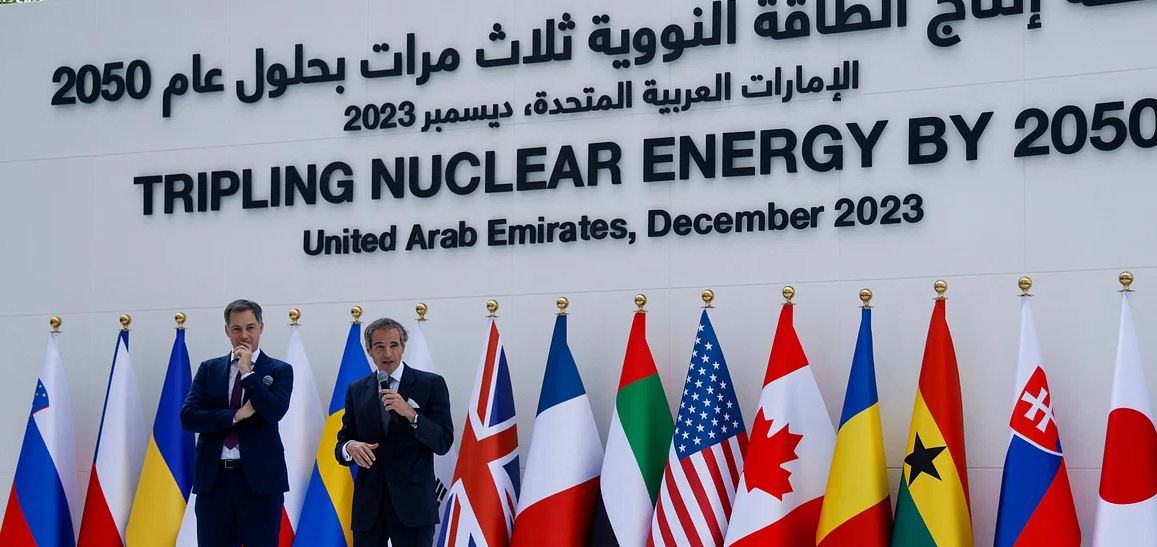The Emirates Nuclear Energy Corporation (ENEC) and Egypt’s Nuclear Power Plants Authority (NPPA), the owner and operator of Egypt’s first nuclear energy plant, have signed a Memorandum of Understanding (MoU) at the 28th UN Climate Change Conference (COP28).
The MoU sets the framework for the two entities to explore opportunities for cooperation in advancing the use of peaceful nuclear energy.
The MoU was signed by Mohamed Al Hammadi, Managing Director and Chief Executive Officer of ENEC, and Professor Dr. Amged El-Wakeel, Board Chairman of NPPA, as global leaders and stakeholders gather at COP28 to advance climate action and policies, furthering the goals of the Paris Agreement and addressing the urgent challenges of climate change.
ENEC, the UAE’s mandated nuclear energy developer and leader of the UAE Peaceful Nuclear Energy Programme, has built industry-leading knowledge through the development of the Barakah Nuclear Energy Plant. The Plant ranks among the largest and most sophisticated nuclear facilities globally and is the primary provider of clean electricity in the region, leading the way in reducing carbon emissions in heavy industries and energy-intensive sectors for the coming six decades. ENEC is also focused on strategic investments, research and development, and innovative approaches to cater to the escalating need for clean energy sources, including the generation of clean electrons and molecules. This approach aims to further strengthen the UAE’s position as a leading nation in accelerating the global clean energy transition to achieve Net Zero.
Al Hammadi commented, “Today, we are in a race to decarbonise, and regional collaboration, signified by the signing of this MoU with NPPA, is crucial for our collective success in expanding nuclear capacity and achieving net-zero emissions by 2050. Our vision is expansive: exploring opportunities for further large-scale plant development, delving into advanced reactors and SMRs, and driving forward research and development. This commitment is not confined to the UAE; through strategic international and regional investments and partnerships, we aim to unlock the full potential of the UAE Peaceful Nuclear Energy Programme.”
The UAE has been leading the way in the global clean energy transition. Over the past five years, the UAE has added the most clean electricity per capita of any country globally. 75 percent of that electricity has come from nuclear energy, exclusively from the Barakah Nuclear Energy Plant in Abu Dhabi powering the nation’s homes and businesses.
ENEC is playing a leading role in driving the global race for tripling nuclear energy capacity by 2050 to meet the growing demand for clean energy and meet Net Zero targets. It launched Net Zero Nuclear initiative, along with the World Nuclear Association (WNA) earlier this year to meet that goal. The initiative has already achieved success following the recent announcement of 22 countries endorsing the mid-century target of tripling worldwide nuclear energy capacity.
As the nations agree that increased investments in nuclear energy are critical for cutting carbon emissions and accelerating the decarbonisation of heavy industries, ENEC is working with local stakeholders to determine deployment pathways, and with international partners for both technology and project collaboration opportunities.
Egypt’s peaceful nuclear energy programme is centred around the development of the El Dabaa Nuclear Power Plant on the Mediterranean coast, approximately 250 km west of Alexandria. The power plant will consist of four VVER-1200 pressurised water reactor units, with a total capacity of 4.8 GW. This capacity is expected to account for up to 50 percent of Egypt’s power generation capacity. Following the construction start date in July 2022, the commissioning of the first unit is expected to begin in 2026, and the plant is anticipated to be operating at full capacity with all four units by 2030.
WAM

